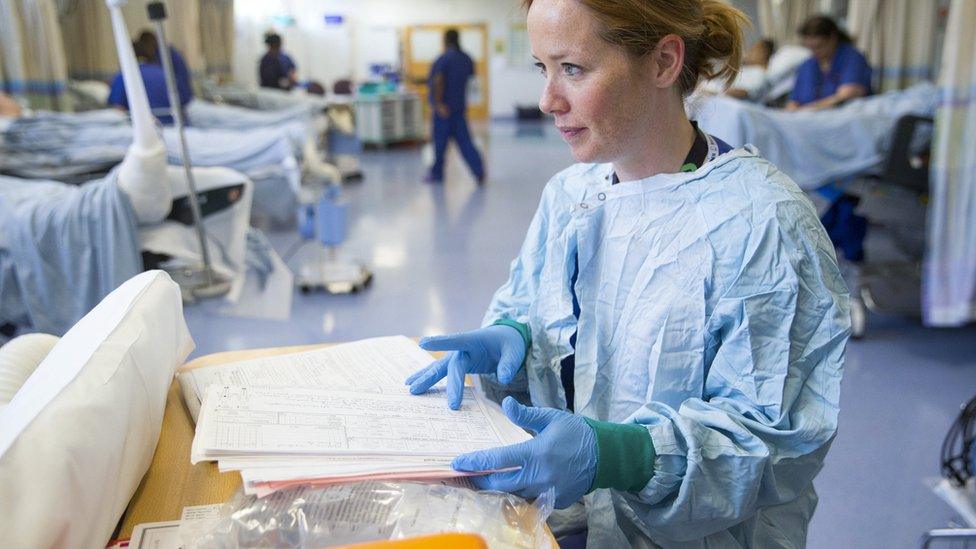NHS plan: What we still need to know
- Published

It was a significant funding announcement - few at senior levels in the NHS in England disagree with that.
But as the dust settles after the weekend, several unanswered questions are still hanging in the air.
What about the areas of health which are not covered? What about investment in hospital buildings and equipment? How will it be paid for?
Five year settlement
NHS funding: PM calls for 10-year plan to spend cash
Chris Ham of the King's Fund told the Â鶹ԼÅÄ's Today programme that the 3.4% annual budget increases above inflation for NHS England amounted to a welcome funding boost which would go "some way to dealing with operational pressures".
Others, including Sir David Nicholson, former head of NHS England, have praised Jeremy Hunt, the Health and Social Care Secretary, for his efforts in robust negotiations with the Treasury which were not concluded till late on Friday night.
Sir David said on Twitter "I do not believe that any other of the Secretaries of State that I have worked for could have got more out of the Treasury than Jeremy Hunt has - congratulations, longevity has its benefits".
Health leaders acknowledge that to be given a five year budget ahead of the main Whitehall spending review is unprecedented in recent times.
They say it will allow them to plan the future delivery of services with more certainty. An extra £4bn annually in real terms by 2023 will be allocated to Scotland, Wales and Northern Ireland as a consequence of the new financial package for England.
But what now can be delivered? Chris Ham has urged caution about promising big improvements.
Frontline services
The health think tanks had argued before the announcement that a 3.3% annual health spending increase in England was needed just to sustain current levels of care, given the demand pressures associated with an ageing population.
The five year spending settlement covers frontline NHS services in England but not investment in new buildings and technology, known as capital spending.
Funding in this area has been cut back in recent years to prop up day to day running costs of hospitals.
Government sources indicate that the capital spending allocations will be set out in the autumn and Jeremy Hunt is expected to call for a 10-year plan. But given the recent squeeze on capital funding there will be scepticism until the details are spelled out.
The money announced over the weekend is for NHS England and does not cover public health, including prevention initiatives.
What's missing
Local authorities are responsible for services in this area and have seen their budgets cut in recent years.
Waiting times for sexual health clinics have increased with finances under pressure.
The funding of Health Education England, covering the training of doctors, nurses and other health professionals, is also not part of the new Government deal.
Like public health, budgets were squeezed and one result was the abolition of free tuition for nurse trainees.
Many in the health world will suspend judgement until financial plans for public health and medical training are set out later this year.
They remember only too well that the former Chancellor George Osborne's plan to fund the NHS in 2014 excluded other areas of health spending.
Social care remains the big unknown.
The government did not promise a funding announcement for both the NHS and social care this summer but is committed to a policy statement (a so-called Green Paper) within weeks.
Ministers know that failure to come up with a credible plan for funding will severely damage the credibility of the new NHS funding strategy.
Caroline Dinenage, the care minister, told the Â鶹ԼÅÄ that dealing with NHS finances and not social care was like running a bath without a tap in place.
Jeremy Hunt, after a hectic few weeks of talks on NHS funding, now has to turn his mind to social care. He told the Today programme it would be "funded so as not to create additional pressure on the system."
The funding package for local authorities providing care, expected in the spending review, will be closely scrutinised.
So too any new ideas put forward to tackle the problems caused by means testing.
A winter of severe strain on the NHS in England and rising waiting times left Mr Hunt and ministerial colleagues under pressure to come up with new money and thinking for a service which was creaking at the seams.
The first important steps have been taken.
Several more will be needed to convince patients and the wider public that the government really has got a grip.
- Published18 June 2018
- Published26 April 2018